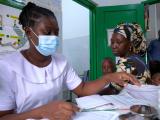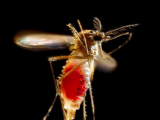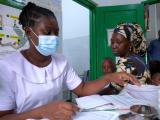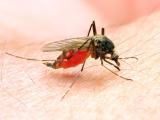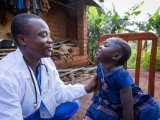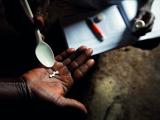Apr 25, 2012 (CIDRAP News) – To mark World Malaria Day, global health groups today warned that funding cuts could erode progress in fighting the disease, a point that was underscored by a new study that highlighted wavering support and a dramatic increase in disease activity in the Democratic Republic of Congo (DRC).
In addition, the World Health Organization (WHO) and other agencies announced new strategies to fight the disease.
The WHO said in a statement that massive efforts to battle malaria with tools such as bed nets, insecticide spraying, and access to prompt medical treatment has cut deaths from the disease by a quarter globally and by a third in Africa since 2000.
Margaret Chan, MD, the WHO's director-general, said the control efforts have saved 1 million lives. "This is a tremendous achievement. But we are still far from achieving universal access to life-saving malaria interventions," she said in the statement.
The WHO pointed out that maintaining current rates of progress won't be enough to meet global malaria control targets, and it urged global health partners to boost their investments in diagnostic testing, treatment, and surveillance. It said countries in which malaria is endemic should ensure that every suspected case is tested, every confirmed case is treated with quality medications, and the disease is tracked through timely and accurate surveillance.
Today it unveiled the final two components of its latest technical guidance package, documents on surveillance for malaria control and surveillance for malaria elimination. Chan said in the statement, "We need strong and sustained political commitment from all countries where malaria is endemic, and from the global health community, to see this fight through to the end.
Meanwhile, Doctors Without Borders (Medicines Sans Frontieres, or MSF) today said a "massive" increase in malaria cases in the DRC is overwhelming the country's medical system, and requires a stepped-up response, according to an MSF statement. It said its hospitals and health centers are reporting that in six of the countries provinces, the number of people treated for malaria has climbed 250% since 2009, with a steep rise in recent months.
MSF said its teams treated more than 45,000 people who had malaria in 2009, and so far this year it has treated 85,000. Many cases, however, go untreated. The group said malaria is the top cause of death in the DRC and that the disease kills 300,000 children under age 5 every year.
Dr Jorgen Stassijns, an MSF malaria specialist, said in the statement that treatment outside of cities is especially scarce and is nonexistent in some areas. "Even when treatment is available, the drugs are sometimes inadequate or outdated," he said.
The organization said the reasons for the malaria surge are unclear, though renewed political instability in some provinces may be playing a role and overstretched health systems may be at the root of the problems in others. MSF called on other international health organizations and the Congolese Ministry of Health to increase their prevention and treatment efforts.
Lapses in malaria control programs are the most common reason for malaria resurgence, according to a study published yesterday in Malaria Journal. A research team from the University of California, San Francisco (UCSF) and Johns Hopkins analyzed instances of malaria resurgence that occurred since 1930. They found that, of 75 instances, 68 (91%) were caused at least in part by weakened funding constraints, according to a UCSF press release.
The group also tracked patterns related to increased disease intensity due to population movement or weather changes, as well as obstacles such as drug and insecticide resistance.
They pointed out that, in India, for example, funding from the US Agency for International Development (USAID) for malaria eradication cut the number of annual cases from about 100 million in the early 20th century to about 100,000 by 1965. However, when the support ended, the country's number of malaria cases grew to a peak of 6 million by 1976.
The researchers said their findings are notable, given that the international partnership Roll Back Malaria has estimated a $9.7 billion funding gap for malaria programs over the next 3 years.
Justin Cohen, PhD, MPH, lead author of the study and senior technical advisor with the malaria control team at the Clinton Health Access Initiative, said in the statement that malaria programs have been successful in driving down malaria cases to very low levels, "but history demonstrates that gains can be lost rapidly if financial and political support is not sustained," he said. "Finding ways to ensure continued funding for malaria control today will be crucial to building on gains of the past decade."
US government health agencies today voiced their commitment to researching the disease and supporting the development of new diagnosis, treatment, and control tools. The National Institute of Allergy and Infectious Diseases (NIAID) in a statement highlighted 10 research centers that it has established in malaria-endemic regions and lauded a research group that it supported, which recently documented the spread of artemisinin-resistant malaria, building a case for new and improved malaria drugs.
NIAID said work continues on the novel anti-malaria compound NITD609, first described by a NIAID-funded group, and that it is supporting eight vaccine candidates in clinical trials, including one that uses live, weakened malaria parasites administered intravenously to provoke a fast immune response against the disease.
Tom Frieden, MD, MPH, director of the US Centers for Disease Control and Prevention (CDC), said in a statement that the CDC's first mission when it began in 1946 was to control malaria in the United States.
He said the agency has played a key role in developing and improving tools used throughout the globe to battle the disease, including treated bed nets and house spraying, as well as a host of clinical resources such as diagnostic tests, effective drugs, and specialized treatment for pregnant women and their babies.
Frieden added that the CDC is working to ensure that current tools are deployed effectively and investigating new ways to track progress to ensure that investments are used wisely. "With increased knowledge, the right tools, and renewed commitment to decrease malaria, we can sustain gains made in the past decade and save lives," Frieden said.
In other malaria developments today, International SOS, a London-based company that helps business prevent and manage medical and disease risks for travelers, employees, and their families, today launched a malaria program that addresses prevention, control, diagnosis, and treatment, according to a press release.
Despite the fall in malaria deaths over the past decade, the number of travelers and expatriates contracting the disease has increased. It said its research shows that malaria is a leading cause of death from infectious disease in expatriates and business travelers. Over the past 12 months, International SOS said it has conducted more than 45 international evacuations for its clients and has coordinated the treatment of many more.
Doug Quarry, MBBS, MSc, medical director at International SOS, said in the statement that in West Africa, for example, some mining operations have reported up to 25% of the workforce sick with malaria over a given month. "Through a targeted, integrated malaria control program, businesses can protect employees, the community and their reputations against the risk of malaria," he said.
See also:
Apr 24 WHO statement
Apr 25 MSF statement
Apr 24 Malaria Journal abstract
Apr 24 UCSF press release
Apr 25 NIAID statement
Apr 25 CDC statement
Apr 25 International SOS press release
